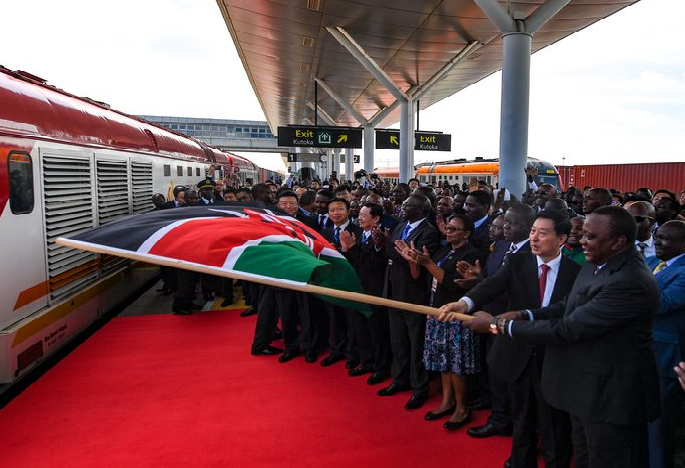NAIROBI, April 25 (Xinhua) -- Kenyas standard gauge railway (SGR) freight service has ferried about 183,350 tons of cargo, including medical supplies and grain, from April 7 to Wednesday, pointing to a robust demand for the trains as the country batt...
NAIROBI, April 25 (Xinhua) -- Kenya's standard gauge railway (SGR) freight service has ferried about 183,350 tons of cargo, including medical supplies and grain, from April 7 to Wednesday, pointing to a robust demand for the trains as the country battles COVID-19 pandemic, the operator said Saturday.
He Fuhan, deputy general manager at Afristar Railway Operation Company, which operates the railway service, said they register 14 freight trains per day on average.
"During this period, 16,544 twenty-foot equivalent unit (TEU) cargo has been delivered, totaling 183,350.6 tons. Between March 25 and April 22, SGR has transported 52 TEUs of COVID-19 prevention materials like disinfectants and ethyl alcohol and also ferried 732 TEUs of grain, totaling 22,143.6 tons," He told Xinhua in an interview.
He attributed the achievement to good use of equipment and facilities, and the joint efforts from all the employees. Some of the employees are working for more than 10 hours a day to ensure transit of goods is safe and efficient, according to him.
"The existing 43 freight locomotives have all been put into use, and are regularly maintained to ensure that all are in good condition," said He, adding this meets the requirements that 16 freight trains operate in a single day.
Kenyan government announced on April 6 to ban all movement by road, rail or air in and out of the Nairobi metropolitan area with effect from 7 p.m. that day in efforts to contain the spread of COVID-19. The cessation of movement within the counties of Kilifi, Kwale and Mombasa shall also be for an initial containment period of 21 days with effect from April 8, the government said.
After the suspension of the passenger services following the government measures, He observed Afristar actively responded and strictly abided by the rules outlined by the Kenyan government.
"Most local employees took leave, leaving some who offer key services. Although the workload has increased and the number of staff on duty decreased, Afristar has ensured that the maintenance operations are carried out in an orderly manner by organizing the management personnel to work on the frontline, and requiring all the employees to work overtime to overhaul and maintain equipment," said He.
The company currently runs with about 20 locomotive professionals, including locomotive drivers and senior assistant locomotive drivers, who now live within its premises, according to He. Enditem
Orginal Source : www.china.org.cn




